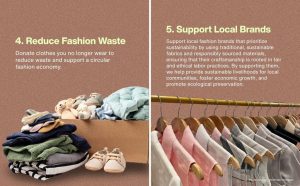
In today’s fast-paced world, the fashion industry has seen a surge in popularity with the rise of fast fashion. Fast fashion brands are known for quickly producing trendy, affordable clothing that is often made with cheap labor and materials. On the other hand, ethical fashion focuses on creating sustainable and ethical products that are made with respect for people and the planet. Let’s delve into the key differences between fast fashion and ethical fashion to help you make informed choices as a consumer.
Quality over quantity
One of the main differences between fast fashion and ethical fashion is the focus on quality. Fast fashion brands prioritize producing a large volume of clothing quickly, which often sacrifices quality. On the other hand, ethical fashion brands prioritize creating high-quality, durable pieces that are made to last. While fast fashion may seem more appealing due to its low prices and trend-driven designs, ethical fashion emphasizes timeless pieces that are made with care and attention to detail.
Transparency and accountability
Another key difference between fast fashion and ethical fashion is transparency and accountability. Fast fashion brands often rely on overseas factories with poor working conditions and low wages. In contrast, ethical fashion brands are transparent about their supply chain and production process, ensuring that workers are treated fairly and paid a living wage. By choosing ethical fashion, you can support brands that prioritize ethical practices and social responsibility.
Sustainability and eco-friendliness
One of the most significant differences between fast fashion and ethical fashion is their approach to sustainability and eco-friendliness. Fast fashion brands contribute to environmental degradation through excessive waste production and the use of toxic chemicals. In contrast, ethical fashion brands prioritize sustainability by using eco-friendly materials, reducing waste, and supporting sustainable practices. By opting for ethical fashion, you can minimize your environmental impact and support brands that are committed to protecting the planet.
Community and social impact
Lastly, fast fashion and ethical fashion differ in their community and social impact. Fast fashion brands often exploit workers in developing countries, prioritizing profit over people. Ethical fashion brands, on the other hand, prioritize fair labor practices, support local artisans, and have a positive social impact on communities. By choosing ethical fashion, you can support brands that empower workers, promote fair wages, and contribute to positive social change.
Conclusion
As a consumer, it’s essential to be aware of the differences between fast fashion and ethical fashion and make informed choices that align with your values. While fast fashion may offer trendy and affordable options, it often comes at the cost of quality, transparency, sustainability, and social responsibility. In contrast, ethical fashion prioritizes quality, transparency, sustainability, and community impact, offering a more ethical and sustainable alternative. By choosing ethical fashion, you can support brands that care about people and the planet, making a positive impact on the fashion industry and the world.

